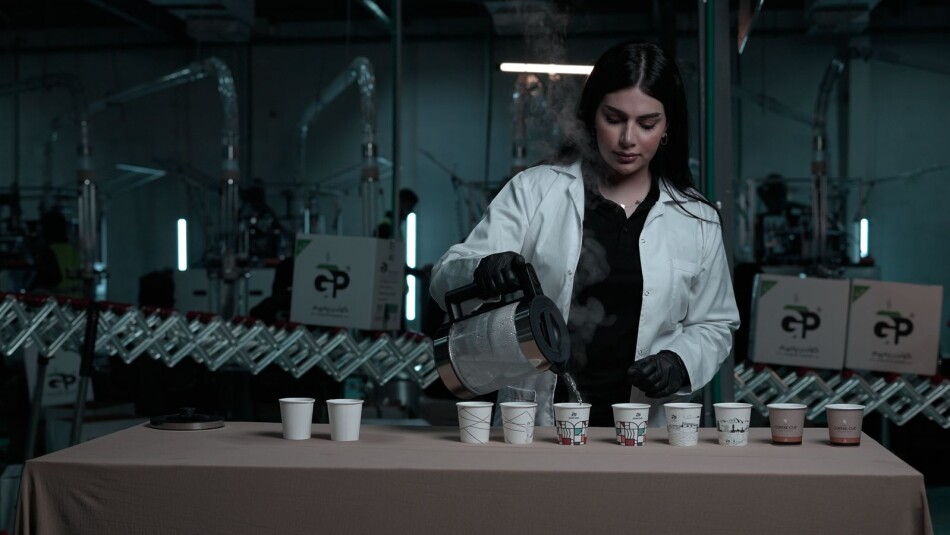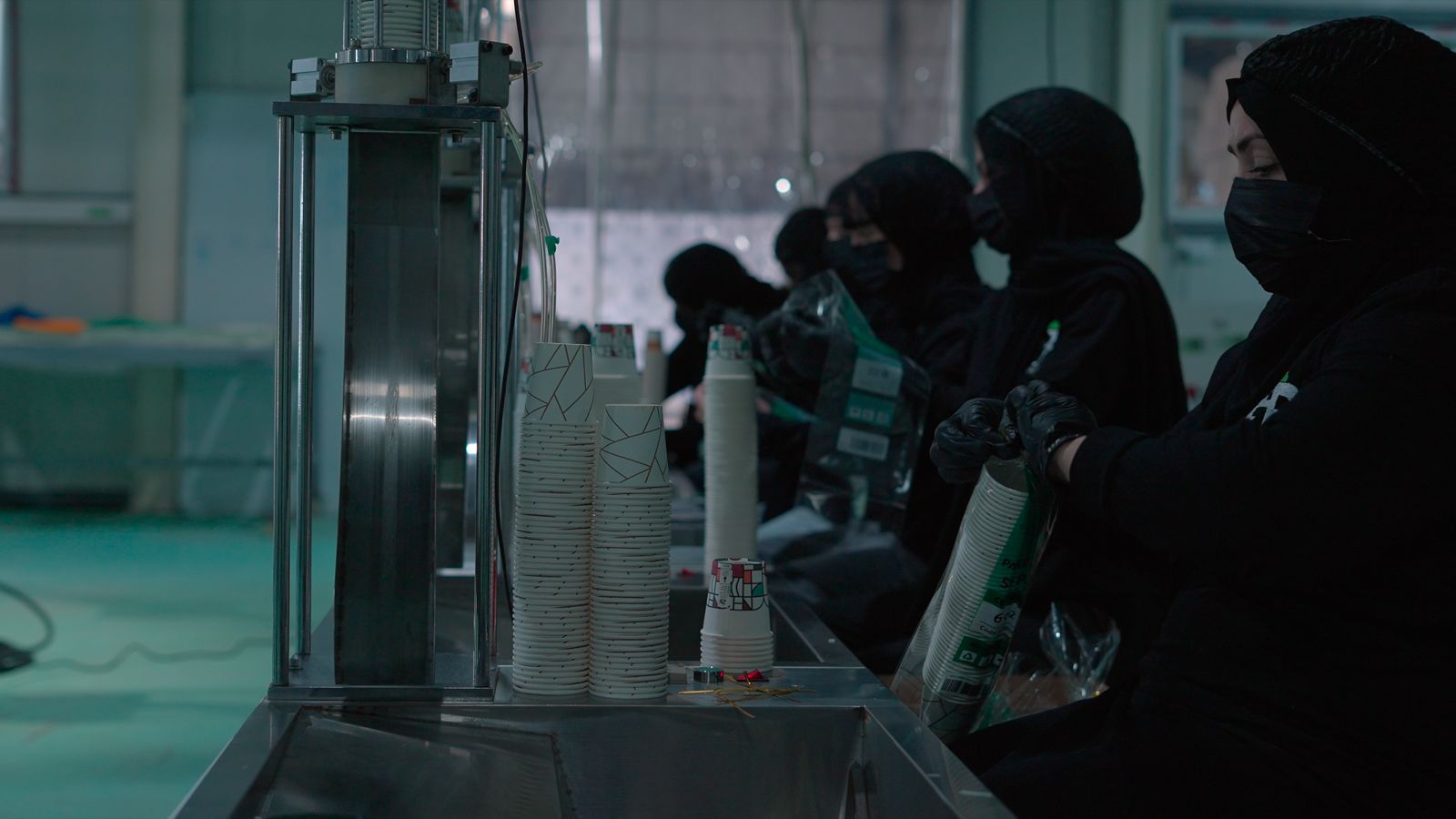
Paper cup and bag factories in Sulaimaniyah are gradually taking steps to save the markets from the grip of plastic, however this step requires spreading environmental awareness.
Paper is eco-friendly and one of its features is its ability to biodegrade in the soil. Over the past few years, two local factories in Sulaimaniyah have intensified their efforts to increase the production of paper cups and bags to become an alternative to plastic and nylon. The step is welcomed, given the damage that plastic causes to the environment.
Humanity produces more than 380 million tons of plastic annually, according to a report by Plastic Oceans.
The report stresses that 50 percent of the plastic produced is suitable for single use only.
According to the United Nations Environment Program, two-thirds of plastic products are short-lived that soon become waste, filling the ocean and, often, working their way into the human food chain.
Commercial initiatives yet eco-friendly
Three years ago, Golden Paper was established to produce paper cups in the Tanjaro area of Sulaimaniyah after the project’s founders felt that there was a growing demand for disposable products.
The supervisor of Golden Paper factory, Bawar Muhammed, told KirkukNow, “our goal was clear, to produce high-quality but environmentally friendly products, so we chose to produce paper cups.”
In the process of making paper cups, we rely only on equipment that “work on electricity and air,” meaning that no type of fuel, such as oil or gas oil, is used in the production process.
“For example, no toxic gases are emitted during production and no waste is left behind, and the cups are made from high-quality raw materials that we import from abroad,” according to Bawar Muhammad.
“Craft Paper Bag” for producing paper bags is another local initiative in Sulaimaniyah which has joined the strife against plastic.
The factory supervisors say that they consume 100 tons of paper monthly to produce five million paper bags. “Some of our customers are interested in protecting the environment. Our products do not cause harm to health or the environment.”
Alwand Hilmi, director of a natural soap factory, uses paper bags to package her factory’s products. She said, “Although the products we sell are not food products, I thought that our natural products should be packaged in eco-friendly bags and wrappers and that we should avoid materials that cause harm to the health and the environment.”
According to the OECD iLibrary, an American website concerned with research and alerting decision-makers, researchers and analysts, humanity produce more than 350 million tons of plastic waste annually and it is expected to reach one billion tons by 2060 if it continues at this rate.
A grave situation… women play positive role
Women make up 95 percent of the workforce at Golden Paper, furthermore they play a major role in purchasing paper bags instead of plastic and nylon ones.

Sulaimaniyah/ 2024/ Women workers at a production line in Golden Paper factory. Photo: Golden Paper factory media
“Having such a large percentage of women in our factory is evidence of our commitment to empowering women in the labor market,” said Bawar Muhammad. “Women always play a major role in all issues, including the environment.”
Shireen Jamal, 50, is one of those women who regularly use disposable products. She says that since she realized the environmental damage plastic causes, she decided “not to buy plastic products unless they are absolutely necessary.”
“I took part in a number of awareness campaigns on environmental issues, especially regarding avoiding the use of disposable plastic products. Now I know the harm of these materials to the environment and health.”
So Shireen says that she has turned to using paper cups and plates made of cornstarch, “Using them is safer. For example, when you pour tea into a paper cup, you do not feel a change in its taste due to the interaction, unlike plastic cups.”
Zhino Khaled, a university professor specialized in environment, says that “environmental pollution by plastic is one of the most common problems nowadays... When there is contact between plastic and a food item, whether through a plastic cup, plate, or bag, micro-plastic particles enter the food item and from there to the human body, causing many health problems.”
Plastic affects the fertilization process, hormonal activities and the brain, meanwhile, burning plastic waste pollutes the air, according to warnings by the United Nations Organization.
Zhino explained that “the irresponsible use of plastic and the lack of awareness among members of society, in addition to the lack of recycling capabilities as in some developed countries, are the main causes of environmental pollution and climate change... Ultimately, it causes damage to the soil, humans and all living beings.”
Zhino pointed out that "these plastic materials are exposed to sunlight and decompose and pollute the environment with chemicals that enter the food chain through micro-organisms in the air, soil and water."
According to statistics from the United Nations, 50 percent of the plastic produced in the world is suitable for single use, and less than 10 percent of it is recycled or reused.
Zhino added that "many studies and researches have proven that micro-plastics, which are very small particles that enter the human body, lead to multiple diseases. According to the studies conducted in the Kurdistan Region, plastic waste comes in second place after food waste."
Plastic alternatives provide the solution
In Sulaimaniyah, 1,000 tons of waste are collected daily by three companies, and according to Zardasht Rafiq, head of the media department at the Sulaimaniyah Municipality, food waste constitutes 60 percent of the total waste.
Zardasht added that “we recycle all recyclable waste, and the remaining is transported to the Tanjaro area south of Sulaimaniyah.”
Worldwide, approximately (400) million tons of plastic waste are produced annually. According to statistics of the United Nations Environment Program (UNEP), one million plastic bottles are purchased every minute, while approximately five trillion plastic bags are used annually worldwide. In total, half of the plastic produced is designed for single use - used once and then thrown away.
Zhino Khalid suggests looking for alternatives to plastic such as paper cups and bags and using them as one way to address the problem.
“Paper and cloth bags can be used more than once unlike plastic bags, so they serve the environment and represent an effective choice, because they will reduce waste,” according to Zhino Khalid.
Yerivan Zana, owner of a cosmetics store, said, “I have been using paper bags for five years, their quality is much higher than plastic bags and they preserve the product.”
She added that “when people see that we care about the environment and health, they trust our products more.”
Yerivan called for attaching importance to products that can be reused, other than plastic materials.
While Zhino said, “The relevant authorities must work to improve the quality of bio-plastic materials that can become another alternative to plastic products made from oil and gas derivatives.”
No recycling
Both Golden Paper and Craft Paper Bag import paper materials from abroad, meaning they do not recycle paper waste domestically.
The supervisors of the Craft Paper Bag factory said that recycled paper cannot be used with food because it is unhealthy. The factory often supplies paper bags to restaurants and bakeries.
The supervisor of the Golden Paper factory, Bawar Muhammad, said that they buy raw materials from China, "To apply the paper recycling system, we need an economic structure and more processing operations. We do not currently have these capabilities, but we will investigate this in the future."
These projects face a number of challenges, including the fact that plastic bags and cups are cheaper than paper ones, which increases the demand on plastic products.
Hazhar Asi, owner of a bakery in Sulaimaniyah, said that “some citizens ask us not to put bread in paper bags because they tear easily and ask us to pack it for them in plastic bags.”
Hazhar indicated that the price of a kilogram of paper bags is double the price of plastic bags and stated that his bakery consumes between a kilogram and two kilograms of plastic bags daily, with each kilogram costing 5,000 Iraqi dinars.
Regarding prices, the supervisors of the “Craft Paper Bag" project stressed that people should realize the fact that “any product that is environmentally friendly and maintains health will cost more.”
The Kurdistan Regional Government ‘s Ministry of Health imposed for the second time this year a ban on the use of plastic bags in bakeries and restaurants and called for replacing them with paper bags, but most of them did not comply with the decision.
In some bakeries, plastic and paper bags are available, but the problem is that many people do not mind putting bread in plastic bags, according to Hazhar Asi.
Bawar Muhammad says that “the government does not provide the necessary support," but he added that "through our products, we were able to significantly reduce the number of users of plastic cups.”